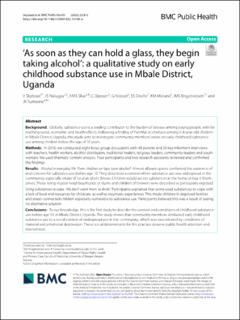| dc.contributor.author | Skylstad, Vilde | |
| dc.contributor.author | Nalugya, J S | |
| dc.contributor.author | Skar, Ane-Marthe Solheim | |
| dc.contributor.author | Opesen, C | |
| dc.contributor.author | Ndeezi, G | |
| dc.contributor.author | Okello, E S | |
| dc.contributor.author | Moland, Karen Marie Ingeborg | |
| dc.contributor.author | Engebretsen, Ingunn Marie Stadskleiv | |
| dc.contributor.author | Tumwine, JK | |
| dc.date.accessioned | 2022-06-21T13:03:19Z | |
| dc.date.available | 2022-06-21T13:03:19Z | |
| dc.date.created | 2022-04-27T12:28:26Z | |
| dc.date.issued | 2022 | |
| dc.identifier.issn | 1471-2458 | |
| dc.identifier.uri | https://hdl.handle.net/11250/2999863 | |
| dc.description.abstract | Background: Globally, substance use is a leading contributor to the burden of disease among young people, with far reaching social, economic and health effects. Following a finding of harmful alcohol use among 5-8-year-old children in Mbale District, Uganda, this study aims to investigate community members’ views on early childhood substance use among children below the age of 10 years.
Methods: In 2016, we conducted eight focus group discussions with 48 parents and 26 key informant interviews with teachers, health workers, alcohol distributors, traditional healers, religious leaders, community leaders and youth workers. We used thematic content analysis. Four participants and two research assistants reviewed and confirmed the findings.
Results: Alcohol in everyday life: ‘Even children on laps taste alcohol’: Almost all participants confirmed the existence of and concern for substance use before age 10. They described a context where substance use was widespread in the community, especially intake of local alcoholic brews. Children would access substances in the home or buy it themselves. Those living in poor neighbourhoods or slums and children of brewers were described as particularly exposed.
Using substances to cope: ‘We don’t want them to drink’: Participants explained that some used substances to cope with a lack of food and resources for childcare, as well as traumatic experiences. This made children in deprived families and street-connected children especially vulnerable to substance use. Participants believed this was a result of seeing no alternative solution.
Conclusions: To our knowledge, this is the first study to describe the context and conditions of childhood substance use before age 10 in Mbale District, Uganda. The study shows that community members attributed early childhood substance use to a social context of widespread use in the community, which was exacerbated by conditions of material and emotional deprivation. These social determinants for this practice deserve public health attention and intervention. | en_US |
| dc.language.iso | eng | en_US |
| dc.publisher | BMC | en_US |
| dc.rights | Navngivelse 4.0 Internasjonal | * |
| dc.rights.uri | http://creativecommons.org/licenses/by/4.0/deed.no | * |
| dc.title | ‘As soon as they can hold a glass, they begin taking alcohol’: a qualitative study on early childhood substance use in Mbale District, Uganda | en_US |
| dc.type | Journal article | en_US |
| dc.type | Peer reviewed | en_US |
| dc.description.version | publishedVersion | en_US |
| dc.rights.holder | Copyright 2022 The Author(s) | en_US |
| dc.source.articlenumber | 812 | en_US |
| cristin.ispublished | true | |
| cristin.fulltext | original | |
| cristin.qualitycode | 1 | |
| dc.identifier.doi | 10.1186/s12889-022-13140-w | |
| dc.identifier.cristin | 2019454 | |
| dc.source.journal | BMC Public Health | en_US |
| dc.identifier.citation | BMC Public Health. 2022, 22, 812. | en_US |
| dc.source.volume | 22 | en_US |

